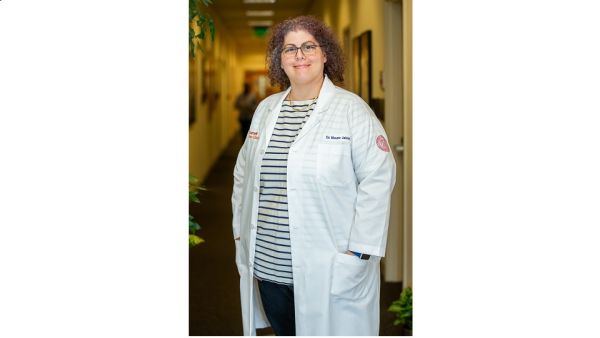Importance of Coaching in Medical Education Highlighted at WCM-Q Grand Rounds

An expert on coaching students in medical education spoke at the most recent instalment of Weill Cornell Medicine-Qatar’s (WCM-Q) Grand Rounds.
Dr. Moune Jabre, assistant professor of clinical obstetrics and gynecology at WCM-Q, explained how advising, mentoring and coaching differ, giving definitions of each with relation to medical education. She also gave several examples of advising, coaching and mentoring in undergraduate medical education, and discussed the benefits of longitudinal coaching for medical students.
Dr. Jabre said: “The key characteristics of the modern physician are that they are lifelong, self-directed learners, they can accurately self-assess their strengths and weaknesses, they are resilient and adaptable, they are extremely competent, and they provide humanistic care. But how do they acquire these attributes? That is where coaching plays a crucial role.”
Dr. Jabre explained that, in contrast to advising and mentoring, coaching considers the learner to be the expert in terms of understanding their needs. While a mentor will share their personal experiences and an advisor will give answers and directions towards specific goals, the role of the coach is to drive the personal development of the student through self-growth and self-determination. This is achieved by helping the learner identify their strengths and weaknesses, asking challenging questions, encouraging realistic but ambitious expectations and goals, and – crucially – converting discussions into actions and facilitating access to useful resources. In medical education, coaching takes place in a place that is exempt from formal evaluation, providing a safe space in which the learner can develop positive attributes without feeling inhibited by a forthcoming test or exam. A good coach must be adept at creating these safe spaces.
Dr. Jabre said: “The dynamic between a coach and a learner is a relationship of equals, based on mutual understanding, trust and respect. Through this relationship, medical students can develop the attributes and resilience necessary to overcome challenges and thrive in demanding residency programs after graduation.”
The lecture was accredited locally by the Ministry of Public Health’s Department of Healthcare Professions – Accreditation Section and internationally by the Accreditation Council for Continuing Medical Education (ACCME).
Background Information
Weill Cornell Medical College in Qatar
Weill Cornell Medicine - Qatar is a partnership between Cornell University and Qatar Foundation. It offers a comprehensive six-year medical program leading to the Cornell University M.D. degree with teaching by Cornell and Weill Cornell faculty and by physicians at Hamad Medical Corporation (HMC), Aspetar Orthopedic and Sports Medicine Hospital, the Primary Health Care Corporation, the Feto Maternal Center, and Sidra Medicine, who hold Weill Cornell appointments. Through its biomedical research program, WCM-Q is building a sustainable research community in Qatar while advancing basic science and clinical research. Through its medical college, WCM-Q seeks to provide the finest education possible for medical students, to improve health care both now and for future generations, and to provide high quality health care to the Qatari population.







